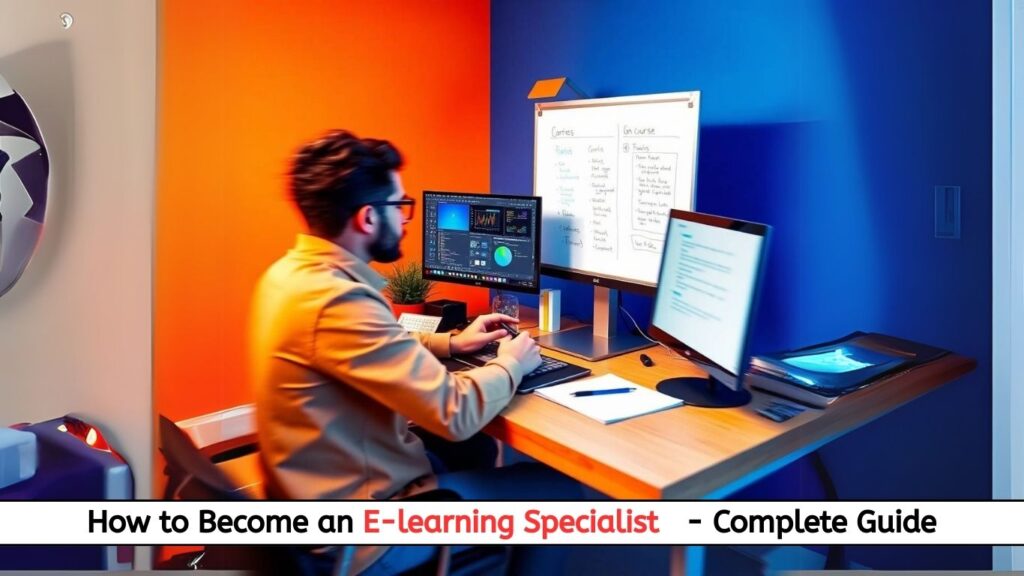
The digital revolution has transformed education and corporate training, making E-Learning Specialists indispensable in today’s tech-driven learning landscape. Whether you’re an educator, instructional designer, or tech enthusiast, this career offers flexibility, creativity, and high earning potential.
This comprehensive guide covers:
✅ History of E-Learning & the Rise of E-Learning Specialists
✅ Salary Expectations (Corporate vs. Academic vs. Freelance)
✅ Key Roles & Responsibilities
✅ Essential Qualifications & Skills
✅ Step-by-Step Guide to Getting Started
✅ Future Trends & Job Outlook
Let’s dive in!
1. The History of E-Learning & the Role of E-Learning Specialists
Early Beginnings (1960s-1990s)
- 1960s: The first computer-based training (CBT) systems emerged.
- 1980s: CD-ROMs became popular for corporate training.
- 1990s: The internet introduced web-based learning, and the term “e-learning” was coined.
The Digital Boom (2000s-2010s)
- 2000s: Learning Management Systems (LMS) like Blackboard & Moodle gained traction.
- 2010s: MOOCs (Massive Open Online Courses) like Coursera, Udemy, and edX revolutionized education.
Today & Beyond (2020s-Future)
- AI-driven adaptive learning, VR/AR training, and microlearning dominate.
- E-Learning Specialists now play a strategic role in corporate training, higher education, and online course development.
2. Salary of an E-Learning Specialist
Salaries vary based on experience, industry, and location:
| Experience Level | Average Salary (Annual) |
|---|---|
| Entry-Level (0-2 yrs) | $50,000 – $65,000 |
| Mid-Level (3-5 yrs) | $65,000 – $90,000 |
| Senior-Level (5+ yrs) | $90,000 – $120,000+ |
| Freelance/Consulting | $60 – $150 per hour |
Top-Paying Industries for E-Learning Specialists
✔ Corporate Training & L&D ($70K – $110K)
✔ Tech & IT Certifications ($75K – $120K)
✔ Higher Education (Universities & Colleges) ($60K – $95K)
✔ Government & Healthcare Training ($65K – $100K)
Freelancers and entrepreneurs can earn $100K+ by selling courses or consulting.
3. Roles & Responsibilities of an E-Learning Specialist
An E-Learning Specialist is more than just a course creator—they design, implement, and optimize digital learning experiences.
A. Instructional Design & Curriculum Development
- Conduct needs assessments to identify learning gaps.
- Design learner-centered courses using ADDIE or SAM models.
- Develop storyboards, scripts, and assessments.
B. Content Development & Multimedia Integration
- Create engaging videos, animations, and interactive quizzes.
- Use tools like Articulate 360, Adobe Captivate, and Camtasia.
- Ensure SCORM/xAPI compliance for LMS compatibility.
C. Learning Management System (LMS) Administration
- Upload, test, and troubleshoot courses on Moodle, TalentLMS, or Cornerstone.
- Track learner progress using analytics and reporting tools.
D. UX & Accessibility Compliance
- Ensure courses are mobile-friendly and WCAG-compliant (for disabilities).
- Optimize navigation for better user engagement.
E. Evaluation & Continuous Improvement
- Conduct A/B testing to improve course effectiveness.
- Gather learner feedback and update content accordingly.
4. Qualifications & Skills Required
A. Educational Background
- Bachelor’s degree in Instructional Design, Education, or Computer Science (preferred but not mandatory).
- Certifications like:
- Certified Professional in Learning & Performance (CPLP)
- ATD’s Instructional Design Certification
- Coursera’s E-Learning & Digital Cultures
B. Technical Skills
✔ Authoring Tools: Articulate Storyline, Adobe Captivate, iSpring
✔ LMS Platforms: Moodle, Blackboard, Docebo
✔ Multimedia Editing: Camtasia, Premiere Pro, Canva
✔ Basic Coding (Bonus): HTML, CSS, JavaScript
C. Soft Skills
✔ Instructional Design Expertise (ADDIE, SAM, Bloom’s Taxonomy)
✔ Project Management (Agile, Trello, Asana)
✔ Analytical Thinking (Data-driven course improvements)
5. How to Get Started as an E-Learning Specialist
Step 1: Learn the Fundamentals
- Take free courses on:
- Coursera – “Instructional Design Masterclass”
- LinkedIn Learning – “E-Learning Essentials”
- Udemy – “Articulate 360 Crash Course”
Step 2: Build a Portfolio
- Create sample courses using free trials of Articulate or Captivate.
- Volunteer for non-profits or small businesses to gain real-world experience.
Step 3: Gain Experience
- Freelance: Join Upwork, Fiverr, or Toptal.
- Corporate Jobs: Look for L&D (Learning & Development) roles.
- Internships: Apply at eLearning companies or universities.
Step 4: Get Certified (Optional but Recommended)
- ATD Certification (Association for Talent Development)
- Certified Online Learning Facilitator (COLF)
Step 5: Network & Stay Updated
- Join LinkedIn Groups (eLearning Industry, ATD Network).
- Attend webinars & conferences (DevLearn, Learning Solutions).
6. Future Scope of E-Learning Specialists
The e-learning market is projected to hit $1 trillion by 2030, with trends like:
🚀 AI & Personalized Learning (ChatGPT tutors, adaptive learning paths)
🚀 VR/AR Training (Immersive simulations for healthcare, engineering)
🚀 Microlearning & Mobile Learning (Bite-sized courses for professionals)
🚀 Gamification & Social Learning (Leaderboards, peer collaboration)
Job Outlook
- 20% growth in e-learning jobs by 2030 (faster than average).
- High demand in corporate training, healthcare, and tech upskilling.
Final Thoughts: Is This Career Right for You?
If you love blending education with technology, becoming an E-Learning Specialist offers high pay, remote work options, and creative freedom.
💡 Pro Tip: Specialize in high-demand niches (cybersecurity, compliance training, AI-based learning).
Ready to Start Your Journey?
📌 Comment below if you want free tool recommendations!
📌 Share this guide with aspiring e-learning professionals!













Post Comment